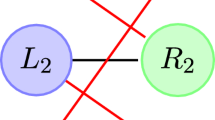Abstract
In a standard path auction, all of the edges in a graph are sold as separate entities, each edge having a single cost. We consider a generalisation in which a graph is partitioned and each subset of edges has a unique owner. We show that if the owner is allowed to apply a non-additive pricing structure then the winner determination problem becomes NP-hard (in contrast with the quadratic time algorithm for the standard additive pricing model). We show that this holds even if the owners have subsets of only 2 edges. For subadditive pricing (e.g. volume discounts), there is a trivial approximation ratio of the size of the largest subset. Where the size of the subsets is unbounded then we show that approximation to within a Ω(logn) factor is hard. For the superadditive case we show that approximation with a factor of n ε for any ε > 0 is hard even when the subsets are of size at most 2.
Access this chapter
Tax calculation will be finalised at checkout
Purchases are for personal use only
Preview
Unable to display preview. Download preview PDF.
Similar content being viewed by others
References
Archer, A., Papadimitriou, C., Talwar, K., Tardos, E.: An approximate truthful mechanism for combinatorial auctions with single parameter agents. In: Procs. of 14th SODA, pp. 205–214 (2003)
Archer, A., Tardos, E.: Frugal path mechanisms. In: Procs. of 13th SODA, pp. 991–999 (2002)
Briest, P., Krysta, P., Vöcking, B.: Approximation techniques for utilitarian mechanism design. SIAM J. Comput. 40(6), 1587–1622 (2011)
Chen, N., Elkind, E., Gravin, N., Petrov, F.: Frugal mechanism design via spectral techniques. In: Procs. of 51st FOCS, pp. 755–764 (2010)
Clarke, E.H.: Multipart pricing of public goods. Public Choice 11(1) (1971)
Dijkstra, E.W.: A note on two problems in connexion with graphs. Numerische Mathematik 1, 269–271 (1959)
Du, Y., Sami, R., Shi, Y.: Path auctions with multiple edge ownership. Theoretical Computer Science 411(1), 293–300 (2010)
Elkind, E., Goldberg, L.A., Goldberg, P.W.: Frugality ratios and improved truthful mechanisms for vertex cover. In: Procs. of the 8th ACM-EC, pp. 336–345 (2007)
Elkind, E., Sahai, A., Steiglitz, K.: Frugality in path auctions. In: Procs. of 15th SODA, pp. 701–709 (2004)
Feige, U.: A threshold of ln n for approximating set cover. Journal of the ACM 45, 314–318 (1998)
Garey, M.R., Johnson, D.S.: Computers and Intractability: A Guide to the Theory of NP-Completeness (1979)
Goldberg, P.W., McCabe, A.: Commodity auctions and frugality ratios. In: Serna, M. (ed.) SAGT 2012. LNCS, vol. 7615, pp. 180–191. Springer, Heidelberg (2012)
Groves, T.: Incentives in teams. Econometrica 41(4), 617–631 (1973)
Hassin, R., Levin, A.: A better-than-greedy approximation algorithm for the minimum set cover problem. SIAM Journal on Computing 35(1), 189–200 (2005)
Kann, V.: Polynomially bounded minimization problems that are hard to approximate. Nord. J. Comput. 1(3), 317–331 (1994)
Karlin, A.R., Kempe, D., Tamir, T.: Beyond VCG: Frugality of truthful mechanisms. In: Procs. of 46th FOCS, pp. 615–626 (2005)
Kempe, D., Salek, M., Moore, C.: Frugal and truthful auctions for vertex covers, flows and cuts. In: Procs. of 51st FOCS, pp. 745–754 (2010)
Nisan, N., Roughgarden, T., Tardos, E., Vazirani, V.V.: Algorithmic Game Theory. Cambridge University Press (2007)
Phillips, R.: Pricing and Revenue Optimization. Stanford University Press (1995)
Stremersch, S., Tellis, G.J.: Strategic Bundling of Products and Prices: A New Synthesis for Marketing. Journal of Marketing 66(1), 55–72 (2000, 2002)
Talwar, K.: The price of truth: Frugality in truthful mechanisms. In: Alt, H., Habib, M. (eds.) STACS 2003. LNCS, vol. 2607, pp. 608–619. Springer, Heidelberg (2003)
Vickrey, W.: Counterspeculation, Auctions, and Competitive Sealed Tenders. The Journal of Finance 16(1), 8–37 (1961)
Author information
Authors and Affiliations
Editor information
Editors and Affiliations
Rights and permissions
Copyright information
© 2013 Springer-Verlag Berlin Heidelberg
About this paper
Cite this paper
Goldberg, P.W., McCabe, A. (2013). Shortest Paths with Bundles and Non-additive Weights Is Hard. In: Spirakis, P.G., Serna, M. (eds) Algorithms and Complexity. CIAC 2013. Lecture Notes in Computer Science, vol 7878. Springer, Berlin, Heidelberg. https://doi.org/10.1007/978-3-642-38233-8_22
Download citation
DOI: https://doi.org/10.1007/978-3-642-38233-8_22
Publisher Name: Springer, Berlin, Heidelberg
Print ISBN: 978-3-642-38232-1
Online ISBN: 978-3-642-38233-8
eBook Packages: Computer ScienceComputer Science (R0)




